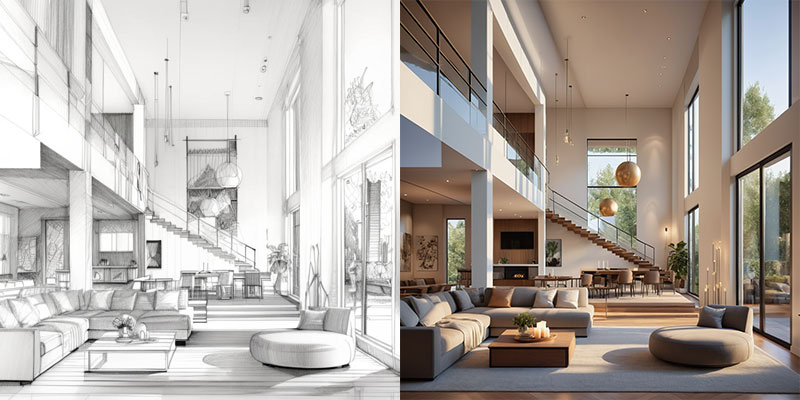Freunde einladen und für beide kostenlose Münzen erhalten

a house has a large brick garage and an upper level entrance
9925
Outstanding architect
KI Bildgenerator
v2
The Garden Laneway House, nestled between garages facing a service lane, is a lyrical collection of modern lines, authentic materials, and deliberate views. Clad in a distinct rotated brick facade, it brings beauty to the laneway and reimagines the potential for small-scale urban densification.
Toronto's recent policy changes allowing Laneway Suites offer homeowners a chance to increase property value while promoting higher density living. This four-bedroom home, designed for a family of five, provides ample living spaces, light-filled rooms, and a strong connection to the neighborhood. By converting the existing home into a duplex, the property now supports three families, offering a practical solution to the housing crisis by integrating additional living spaces into established communities.The design of the Garden Laneway House effectively addresses common drawbacks of laneway homes such as limited space, privacy issues, and unappealing sightlines. Its compact footprint, modest floor-to-ceiling heights, and tight envelope contribute to its efficiency in heating, cooling, and maintenance.
The family uses the laneway as their main entrance, which is tucked under a carport canopy clad in charred cedar to maintain privacy from nearby garages. The house's most striking feature is its rotated brick facade, selected to provide a robust presence akin to Toronto’s main street houses, contrasting sharply with the typical wood and aluminum-clad garages. The rotated bricks create a dynamic pattern of light and shadow, adding a three-dimensional element to the facade and breaking up the solid exterior.The rotated brick design involves cantilevering every other row of bricks over the one below, creating a playful massing that changes with the sun's movement. This design not only achieves aesthetic goals but also ensures excellent building envelope performance, promising longevity.Programmatically, the house is flipped upside-down. The primary suite is on the lowest floor, lit with a large lightwell. The teenager’s bedrooms are on the ground floor and the living spaces are on top with picturesque views of the neighbouring treetops.Material innovation plays a crucial role in maximizing interior space. The use of a cold-formed steel joist system increased ceiling height by four inches per level, allowing services to run through the supports and eliminating the need for dropped ceilings. Smart home lighting and zone-specific radiant heating and cooling systems enhance efficiency and comfort, achieving a TEDI of 27.50 kWh/m2/yr.In a nod to community integration, all the artwork in the home was commissioned from neighbourhood artists. In the entry hall, light filters down from the skylight illuminating a painting by Peter Owusu-Ansah. Owusu-Ansah, a Ghanaian-born deaf artist, believes that we can communicate through our eyesight, without words. This vibrant and poetic piece is a visual guide that draws you through the corridor and leads you towards the upper floor.
Stil:
Fotografie-Architektonische Darstellung
Szene:
Tag,Futuristisch 3
Perspektive:
Ultra-Weitwinkelobjektiv für sehr lange Distanzen
Verhältnis:
1:1
Beleuchtung:
Kodachrome
0
Remix
0
Gefällt mirBisher keine Kommentare
Mehr ähnliche Inhalte
a house has a large brick garage and an upper level entrance
9925
Outstanding architect
KI Bildgenerator
v2
The Garden Laneway House, nestled between garages facing a service lane, is a lyrical collection of modern lines, authentic materials, and deliberate views. Clad in a distinct rotated brick facade, it brings beauty to the laneway and reimagines the potential for small-scale urban densification.
Toronto's recent policy changes allowing Laneway Suites offer homeowners a chance to increase property value while promoting higher density living. This four-bedroom home, designed for a family of five, provides ample living spaces, light-filled rooms, and a strong connection to the neighborhood. By converting the existing home into a duplex, the property now supports three families, offering a practical solution to the housing crisis by integrating additional living spaces into established communities.The design of the Garden Laneway House effectively addresses common drawbacks of laneway homes such as limited space, privacy issues, and unappealing sightlines. Its compact footprint, modest floor-to-ceiling heights, and tight envelope contribute to its efficiency in heating, cooling, and maintenance.
The family uses the laneway as their main entrance, which is tucked under a carport canopy clad in charred cedar to maintain privacy from nearby garages. The house's most striking feature is its rotated brick facade, selected to provide a robust presence akin to Toronto’s main street houses, contrasting sharply with the typical wood and aluminum-clad garages. The rotated bricks create a dynamic pattern of light and shadow, adding a three-dimensional element to the facade and breaking up the solid exterior.The rotated brick design involves cantilevering every other row of bricks over the one below, creating a playful massing that changes with the sun's movement. This design not only achieves aesthetic goals but also ensures excellent building envelope performance, promising longevity.Programmatically, the house is flipped upside-down. The primary suite is on the lowest floor, lit with a large lightwell. The teenager’s bedrooms are on the ground floor and the living spaces are on top with picturesque views of the neighbouring treetops.Material innovation plays a crucial role in maximizing interior space. The use of a cold-formed steel joist system increased ceiling height by four inches per level, allowing services to run through the supports and eliminating the need for dropped ceilings. Smart home lighting and zone-specific radiant heating and cooling systems enhance efficiency and comfort, achieving a TEDI of 27.50 kWh/m2/yr.In a nod to community integration, all the artwork in the home was commissioned from neighbourhood artists. In the entry hall, light filters down from the skylight illuminating a painting by Peter Owusu-Ansah. Owusu-Ansah, a Ghanaian-born deaf artist, believes that we can communicate through our eyesight, without words. This vibrant and poetic piece is a visual guide that draws you through the corridor and leads you towards the upper floor.
Stil:
Fotografie-Architektonische Darstellung
Szene:
Tag,Futuristisch 3
Perspektive:
Ultra-Weitwinkelobjektiv für sehr lange Distanzen
Verhältnis:
1:1
Beleuchtung:
Kodachrome
0
Remix
0
Gefällt mirBisher keine Kommentare


























